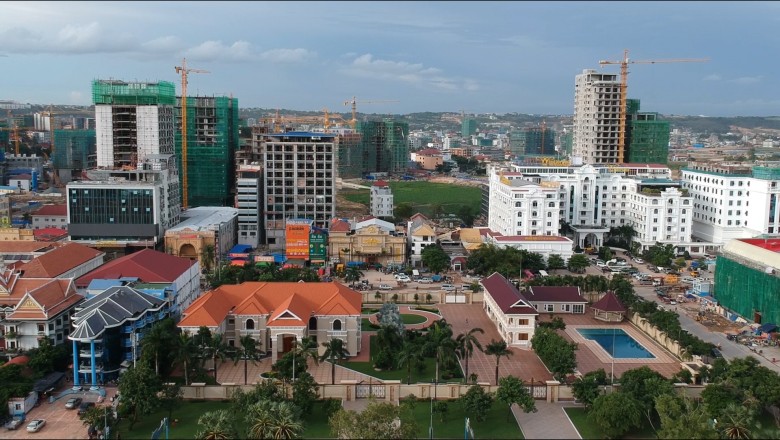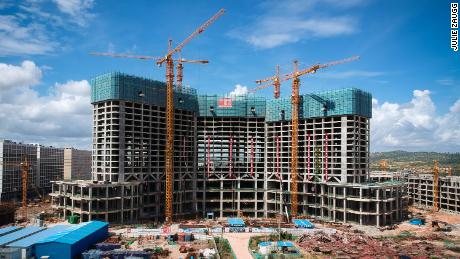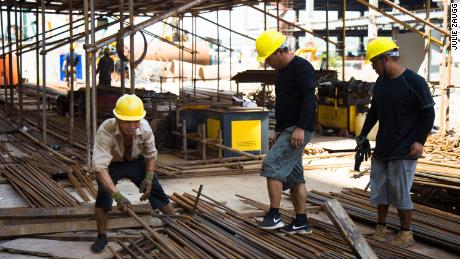Most of this activity is due to Chinese developers, says Astrid Noren-Nilsson, a Southeast Asian studies expert from Lund University in Sweden. "An estimated 90% of businesses in Sihanoukville, including hotels, restaurants and entertainment establishments, are now owned by the Chinese," she says.
Many building fronts in Sihanoukville are now covered in Chinese characters. On the beachfront, Sichuan hotpots have replaced plenty of the 50-cent beer joints beloved by Western travelers.
This has had far-reaching consequences for locals, squeezing their income from traditional backpacker tourism channels, pushing some into dangerous jobs on construction sites and bringing a thriving casino industry to the city, which has caused many residents to lose their homes.
"It is extremely easy to obtain a casino license in Cambodia," says Ben Lee, the founder of IGamiX, a Macao-based consultancy firm focused on the gaming industry in Asia. "To get one, all you need is to prove you have a parcel of land and to pay an application fee to the Cambodian ministry of finance, which is in charge of overseeing casinos."
Casino operators here aren't required to check their customer's identity or verify the origins of their funds, according to several industry experts. Earnings from gaming are not taxed, although the government collects a monthly fee from bigger casinos and a fixed levy on each table and slot machine from smaller ones, Lee adds.
Sihanoukville has also become a hotbed for online casinos.
In one establishment, tucked away in a side street, a row of women wearing black lace leotards shuffle cards. They stare into cameras with fixed smiles. There are no players. "The game is live-streamed to bettors -- usually based in China -- who play remotely," explains Jonny Ferrari, a Canadian online gaming consultant who lives in Sihanoukville.
The online casino industry is sparsely regulated. "I have seen Chinese businessmen buy a building, get a casino license and rent out sections to various online casino operators," Ferrari says. "As long as they pay the rent, no questions are asked. They don't even have to show identification."
These virtual operations are legal in Cambodia but not in China, where gambling is forbidden.
To get around this prohibition -- and Beijing's strict foreign exchange controls -- Ferrari says "agents collect the money in China, using WeChat Pay or in Bitcoin, and a local representative in Cambodia provides a cash advance." He will use any future gains to repay himself.
Thanks to this underground banking system, no money actually crosses the border.
A close friendship
Chinese companies started taking root in Cambodia in the late 1990s. But their interest really spiked after President Xi Jinping launched China's Belt and Road Initiative (BRI) -- his grand plan to push the country's influence globally -- in 2013.
"Just this year, new projects valued at $4.8 billion have been announced," says Andrew Davenport from RWR Advisory Group, an agency tracking Chinese investments.
The investments make sense commercially. Chinese manufacturers profit from the lower wages in Cambodia and use it as a base to avoid American tariffs on Chinese goods. In Sihanoukville, the Chinese company Jiangsu Taihu Cambodia International Economic Cooperation Investment and a local partner have set up a special economic zone on the outskirts of town.
There are also geo-strategic considerations for China to be invested in Cambodia. Davenport adds: "Cambodia has become Beijing's main ally in Southeast Asia. It systematically backs China's claims to the South China Sea within the Association of Southeast Asian Nations (ASEAN)."
Zero-dollar tourists
Many of these holidaymakers were traveling abroad for the first time, according to local business people working in the tourism sector. Generally, they prefer to stay in hotels and eat in restaurants staffed by fellow Chinese. Some are bused straight from the airport to a casino and spend a week gambling before heading back to China.
Locals call these travelers "zero-dollar tourists," because they spend virtually no money in Cambodia -- coming in on package tours, their whole stay is paid for before they leave China.
For that reason, many Sihanoukville residents who depend on tourism say their revenues have vanished almost overnight. A row of shuttered restaurants and abandoned bungalows on Otres Beach, traditionally one of the more popular spots, highlights the extent of the problem.
"I still get a few local customers, but Chinese tourists don't come here and the Western ones have fled," says Keo Puth Vireak, a 50-year-old who operates a stall on the beach. "I liked them better. They were here to have fun, not just gamble. And they understood that us locals need to make a living."
Behind the beach, a street that used to be full of bars and travel agents is now covered in "for sale" signs. "The workers came one day, emptied out the lake and cut down all the trees," says Sina, the son-in-law of Sok Sabay Resort's owner, standing on a veranda that used to look out onto a picturesque pond and now sits next to a construction site.
Life-threatening jobs
Many of the limited jobs left for locals are tough and dangerous, says Athit Kong, a trade unionist. "On the construction sites, Chinese workers take on all the qualified jobs," he says. "Cambodians are only hired to do menial work."
In Sihanoukville, many local laborers wear sneakers and work without helmets. They tie T-shirts around their mouths to protect themselves against dust. "We have quite stringent laws regarding worker safety in Cambodia, but they are rarely enforced," Kong says. CNN contacted the Cambodian Ministry of Land Management, Urban Planning and Construction about allegations workers lack proper safety equipment, but did not receive a reply.
The workers usually live within the compound they are constructing. "This is a major safety hazard," Kong adds. "A half-finished structure can come crashing down at any time."
In June, Kreal Oeun and her husband were asleep in the middle of the night when the Sihanoukville building they lived in came crashing down, killing 28 people.
The couple spent 12 hours trapped under the rubble. "It was terribly hot and we didn't have anything to drink," says her husband, 30-year-old Nhov Channeth. "To survive, we had to lick the condensation on the walls."
Channeth says his 18-year-old brother, who was supposed to get married this year, died in the accident.
Today, a heavy plaster cast covers Oeun's leg. Underneath, the 28-year-old's foot has started to blacken from gangrene. "We didn't have enough money to pay the hospital doctors so they only gave us a few pills," says Channeth, whose arms are covered in scars from the accident.
Oeun and Channeth left the Cambodian capital Phnom Penh to work in Sihanoukville two months before the accident, leaving their children, ages 5 and 10, behind. "We had debts and we needed money for their education," says Channeth. They say their Chinese employer paid them $15 a day -- 50% more than they would have earned back home.
Even the casino jobs are not as good as they might seem, says Maggie Eno, who has lived in Sihanoukville since 2003 and founded an NGO to help children. "I've seen 13-year-old girls stop school to work as a croupier," she says. "They work 12-hour shifts and are regularly harassed by the customers."
CNN sent a series of questions to the Cambodian Ministry of Land Management, Urban Planning and Construction, as well as to the Cambodian Ministry of Economy and Finance, on the safety issues faced by the construction industry, the deteriorating job prospects for locals in Sihanoukville and the lack of regulation of the casino industry, but did not receive a reply.
The Chinese Ministry of Foreign Affairs admitted at least one Chinese national had been implicated. "He is currently under the control of the Cambodian police and China believes that the dedicated Cambodian organ will deal with the case justly and handle the violators in accordance with the law," a spokesperson said in responses faxed to CNN.
'Life is hard'
As the Chinese money pours in, Sihanoukville's infrastructure is struggling to cope with the level of development. "There are regular water outages and power cuts," says Eno, who says her NGO is seeing more cases of dengue and typhoid because of poor drainage.
But the biggest hardship for many locals is no longer being able to afford to live in their city. A two-bedroom flat that used to cost $300 a month now costs up to $3,000 after demand for rentals ballooned to accommodate Chinese residents.
In one area, about 100 families live in shacks with corrugated metal roofs and dirt floors on a 10-meter (32 feet) wide strip of land between a busy road and a fence. "We have been here for 13 years," says 66-year-old resident Boeun Korng. "Life is hard. We have to rely on a single well for the whole community and we don't have electricity."
Evicted from their rice paddies in 2007, they say they will soon have to move again to make way for the new Chinese-built highway between Sihanoukville and Phnom Penh. "We have been offered 5-by-20-meter lots in an isolated area with no infrastructure," Korng adds. "We will never leave. We would rather die here."
Their story is not unusual in Sihanoukville, explains Sreng Vanly, who works for Cambodian human rights NGO LICADHO: "There is a recurring pattern where poor residents are forcibly evicted by a local businessman who is then awarded the right to rent or sell their land to Chinese investors for a profit."
The Cambodian Ministry of Land Management, Urban Planning and Construction did not respond to CNN's requests for comment on the environmental and housing issues faced by local residents. China's foreign ministry said it was "willing to cooperate with Cambodia" to improve the local sewage system, adding: "China has been actively participating in Cambodia's construction, supporting Chinese enterprises to invest in the country and encouraging Chinese tourists to visit, sincerely hoping to bring more tangible benefits to the Cambodian people via cooperation."
In its responses to CNN, The Chinese Ministry of Foreign Affairs said that "online gambling is like a malignant tumor," adding that it "is willing to work with Cambodia to adopt practical measures, deepen law enforcement and eradicate it."
But it might be too late, says Eno: "People are angry. ... Anti-Chinese sentiment is on the rise."
Read more https://www.cnn.com/2019/10/04/asia/cambodia-chinese-investment-intl-hnk/index.html
| < Prev | Next > |
|---|









 Copyright © 2025 ToCasino.net Online Casino. All Rights Reserved. Designed by
Copyright © 2025 ToCasino.net Online Casino. All Rights Reserved. Designed by